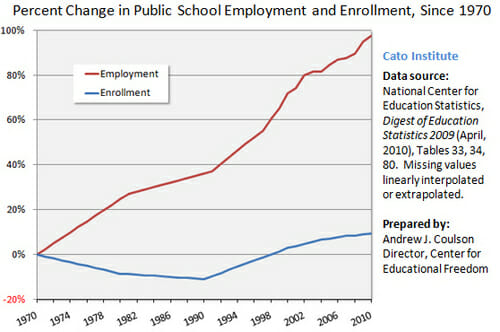The most important news, I suppose, is that Arizona has made its new immigration law more palatable with a few changes.
The first concerns the phrase "lawful contact," which is contained in this controversial portion of the bill: "For any lawful contact made by a law enforcement official or a law enforcement agency"¦where reasonable suspicion exists that the person is an alien who is unlawfully present in the United States, a reasonable attempt shall be made, when practicable, to determine the immigration status of the person"¦" Although drafters of the law said the intent of "lawful contact" was to specify situations in which police have stopped someone because he or she was suspected of violating some other law "” like a traffic stop "” critics said it would allow cops to pick anyone out of a crowd and "demand their papers."
So now, in response to those critics, lawmakers have removed "lawful contact" from the bill and replaced it with "lawful stop, detention or arrest." In an explanatory note, lawmakers added that the change "stipulates that a lawful stop, detention or arrest must be in the enforcement of any other law or ordinance of a county, city or town or this state."
"It was the intent of the legislature for "˜lawful contact' to mean arrests and stops, but people on the left mischaracterized it," says Kris Kobach, the law professor and former Bush Justice Department official who helped draft the law. "So that term is now defined."
The second change concerns the word "solely." In a safeguard against racial profiling, the law contained the phrase, "The attorney general or county attorney shall not investigate complaints that are based solely on race, color or national origin." Critics objected to that, too, arguing again that it would not prevent but instead lead to racial profiling. So lawmakers have taken out the word "solely."
"There were misstatements by the opponents of the law that this was written to permit some consideration of race in the enforcement of this law," says Kobach, "and that's not the case at all."
It is hard for me to separate in my mind whether the problem I have with what remains is really with this law or with the individuals whom I know to be tasked with its enforcement. Sheriff Joe Arpaio has a history of pulling over every Mexican he runs into with a broken tail light on his crime sweeps, so in actual practice, the requirement of there being some other crime involved doesn't do much to make me fear profiling any less. But its hard for me to say that checking immigration status of people arrested or detained is unreasonable, so it may be I am just uncomfortable with the overzealous enforcements and Sheriff Joe's patented crime sweeps. (I am still opposed to the socialist definition of property rights that conservatives have adopted in the law).
I thought Megan McArdle had an interesting point:
If the immigration problems in Arizona are really so serious that they merit deep intrusions upon the liberty of citizens who happen to resemble illegal immigrants, than they are serious enough to intrude on the liberty of everyone. Don't make the cops check the status of anyone who they "reasonably suspect" is illegal; make them check the status of everyone, no matter how blond-haired, blue-eyes, and fluent in standard American english they may be. If you forget your license at home, the police detain you, just like they detain anyone of mexican descent, while someone fetches it. If you can't produce a birth certificate, passport, or similar, then you wait in the pokey until they can verify your legal status. No police discretion. No profiling.
We can illustrate McArdle's point with an example, where our sheriff's descended on a local business and zip-tied and detained anyone who looked Hispanic until they could produce proof of immigration status. No Anglos at this location were treated the same way:
Deputies from the Maricopa County Sheriff's Office raided a Mesa landscaping company early Wednesday morning, arresting nearly three dozen people suspected of being in the country illegally.
The raid on offices of Artistic Land Management, on Main Street just west of Dobson Road, happened about 4:30 a.m., according to one worker who was handcuffed and detained before being released when he produced documentation that he was in the country legally"¦.
Juarez estimated about 35 workers were handcuffed with plastic zip-ties while deputies checked for documents. Those who could provide proof they were in the country legally were released, while others were put on buses and taken away.
This is something the bill supporters just don't want to deal with -- the ugly sight of all the brown skinned workers at a location separated out from their peers and zip-tied until they can produce the proper government papers.
Daniel Griswold of Cato offered what I thought was an excellent framework for thinking about immigration and immigration reform:
Requiring successful enforcement of the current immigration laws before they can be changed is a non sequitur. It's like saying, in 1932, that we can't repeal the nationwide prohibition on alcohol consumption until we've drastically reduced the number of moonshine stills and bootleggers. But Prohibition itself created the conditions for the rise of those underground enterprises, and the repeal of Prohibition was necessary before the government could "get control" of its unintended consequences.
Illegal immigration is the Prohibition debate of our day. By essentially barring the legal entry of low-skilled immigrant workers, our own government has created the conditions for an underground labor market, complete with smuggling and day-labor operations. As long as the government maintains this prohibition, illegal immigration will be widespread, and the cost of reducing it, in tax dollars and compromised civil liberties, will be enormous.
It turns out that after excoriating the Arizona law as being too intrusive, Democrats have responded with ... something even more intrusive.
Sometimes I just love the Democrats. After fomenting a near meltdown over the Arizona immigration law, with charges of nazism and cries of "show me you papers!" flying hither and yon, the Democrats introduce an immigration framework with what?
Improved papers, of course.
Yes, the Dems screwed the pooch and included a national ID card in their proposed legislation. And a biometric one at that. As someone characterized it, it's a "super Social Security card". Remember when you were assured that your SS card/number was not for identification purposes and never would be. Well Bunky, that was as true as most of the promises politicians make.
Democratic leaders have proposed requiring every worker in the nation to carry a national identification card with biometric information, such as a fingerprint, within the next six years, according to a draft of the measure.
As a final note, for years I have asked strong exclusionist conservatives how they square their opposition to immigration with their desire for freedom of contract and exchange. After all, if commerce is free, do I not have the right to hire anyone I want for a job, no matter where that person was born. Why do Conservatives want to require that all workers have government licenses before they can be hired? It turns out that the ACLU makes the same point in response to the above proposal (from the link above, emphasis added):
"Creating a biometric national ID will not only be astronomically expensive, it will usher government into the very center of our lives. Every worker in America will need a government permission slip in order to work. And all of this will come with a new federal bureaucracy "” one that combines the worst elements of the DMV and the TSA," said Christopher Calabrese, ACLU legislative counsel.
Note to Conservatives-- when the ACLU, founded by Marxists and which to this day resists recognizing property rights, gets out ahead of you on the rights to free exchange and commerce, you are in trouble.
Update: More from Brad Warbiany and Matt Welch


